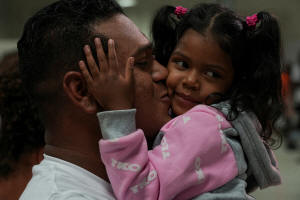Democrat-led Texas city steps up migrant busing to New York, outpacing
Republican effort
 Send a link to a friend
Send a link to a friend
 [October 06, 2022]
By Ted Hesson, Paul Ratje and Kristina Cooke [October 06, 2022]
By Ted Hesson, Paul Ratje and Kristina Cooke
EL PASO, Texas (Reuters) - The Democrat-led
border city of El Paso, Texas, has sent more migrants on buses to New
York City and Chicago than a campaign by Texas' Republican governor, a
twist in an ongoing partisan battle over U.S. border security.
El Paso, which sits across the border from Juarez, Mexico, has bused
roughly 7,000 migrants to New York City since late August and sent more
than 1,800 to Chicago, a city-run effort that far exceeds the more
ad-hoc transportation of the past.
The city's busing effort has received less attention than a separate
statewide campaign by Texas Governor Greg Abbott, who is seeking a third
term in Nov. 8 midterm elections. Abbott has bused more than 3,000
migrants to New York City and more than 900 to Chicago as part of a high
profile campaign to put a spotlight on the record crossings at the
U.S.-Mexico border.

Texas and Arizona combined have also bused over 10,000 migrants to
Washington, D.C. Meanwhile, Florida's Republican Governor Ron DeSantis
recently flew a group of about 50 migrants to Martha’s Vineyard,
Massachusetts, but those who boarded the planes have said they were
misled.
The Republican initiatives to move migrants, including those seeking
asylum, away from the border have called attention to the issue with the
election just weeks away. A recent Reuters/Ipsos poll showed U.S. voters
prefer them over Democrats for addressing immigration issues.
The Democratic administration of U.S. President Joe Biden and Democratic
mayors receiving the migrants have criticized the Republican governors
for creating confusion with surprise drop-offs and say the busing
campaign strains resources.
But El Paso's Democratic leaders say they are coordinating with
receiving cities and that migrants take their chartered buses
voluntarily. City officials say their buses were needed because up to
2,000 migrants were arriving daily, including impoverished Venezuelans
without family in the United States to pay for onward travel.
Coordination between sending and receiving cities is crucial, according
to Theresa Cardinal Brown, a managing director with the Bipartisan
Policy Center, a Washington-based think tank.
"If there's not coordination," she said, "you're basically dropping
penniless people who don't speak the language in an unknown city and
saying, 'Fend for yourself.'"
Still, El Paso's coordination could be better, said New York City
mayoral spokesperson Kate Smart. El Paso informs New York when a bus is
traveling to the city, but, she adds, officials from both states should
discuss beforehand whether the bus actually needs to go New York and how
many migrants are onboard.
Many of those sent to New York are Venezuelans, who have been arrested
at the border in higher numbers than ever before. The United States
cannot expel them to Mexico under a pandemic-era order as it can other
migrants.
El Paso's program is not new: last year, the city hired a handful
charter buses to transport migrants to nearby cities, a city official
said.
[to top of second column]
|

Venezuelan Frederick Pinango, 28, kisses
his three-year-old daughter Freyderlinck Paola Pinango while waiting
for their bus at the Migrant Welcome Center managed by the city of
El Paso and the Office of Emergency Management, in El Paso, Texas,
U.S., October 3, 2022. REUTERS/Paul Ratje

But when overwhelmed U.S. border authorities began releasing
hundreds of migrants at a time in El Paso in August and September,
the city started busing to New York and Chicago.
'COMPLETELY DIFFERENT'
The buses now depart from a converted warehouse in northeast El Paso
that serves as a migrant processing center. On Monday, several
hundred migrants waited for buses to New York City and Chicago,
among them Frederick Pinango, 28, and his wife and 3-year-old
daughter.
The Venezuelan family trekked through the Darien Gap, an often
dangerous passage through a jungle separating Colombia and Panama.
They worked their way through Central America and Mexico by cleaning
bathrooms, emptying trash and begging, according to Pinango.
They took a bus to New York because they had no contacts in the
United States and it was free.
"I have faith that they will help us with some shelter, so I can
start to work," he said.
Edwin Rico, a 28-year-old Venezuelan who boarded a bus to Chicago on
Monday, said the food that El Paso officials provided for the trip
was not enough, but he rationed it.
"I don’t have money, so I’m grateful for the help," he said.
El Paso Mayor Oscar Leeser, a Democrat, said the city's program is
"completely different" than the other busing efforts and that they
seek to "treat people with respect."

New York City Mayor Eric Adams, also a Democrat, has slammed Abbott,
the Republican governor, for his refusal to share information about
bus arrivals. Adams said in a mid-September press conference that
Leeser, unlike Abbott, was willing to meet and "figure out a humane
way to coordinate."
New York City officials traveled to El Paso last month to watch the
process firsthand. During the visit, they discussed adding drop-off
points in cities on the way to New York, Leeser said.
El Paso keeps in contact with the Biden administration and is
seeking federal reimbursement for busing costs, Leeser said, and a
U.S. Department of Homeland Security spokesperson confirmed the
coordination.
"This is a federal issue," Leeser said. "They’re not coming to El
Paso, they’re coming to the United States."
(Reporting by Ted Hesson in Washington, Paul Ratje in El Paso,
Texas, and Kristina Cooke in San Francisco; Editing by Mica
Rosenberg and Aurora Ellis)
[© 2022 Thomson Reuters. All rights
reserved.]
This material may not be published,
broadcast, rewritten or redistributed.
Thompson Reuters is solely responsible for this content. |